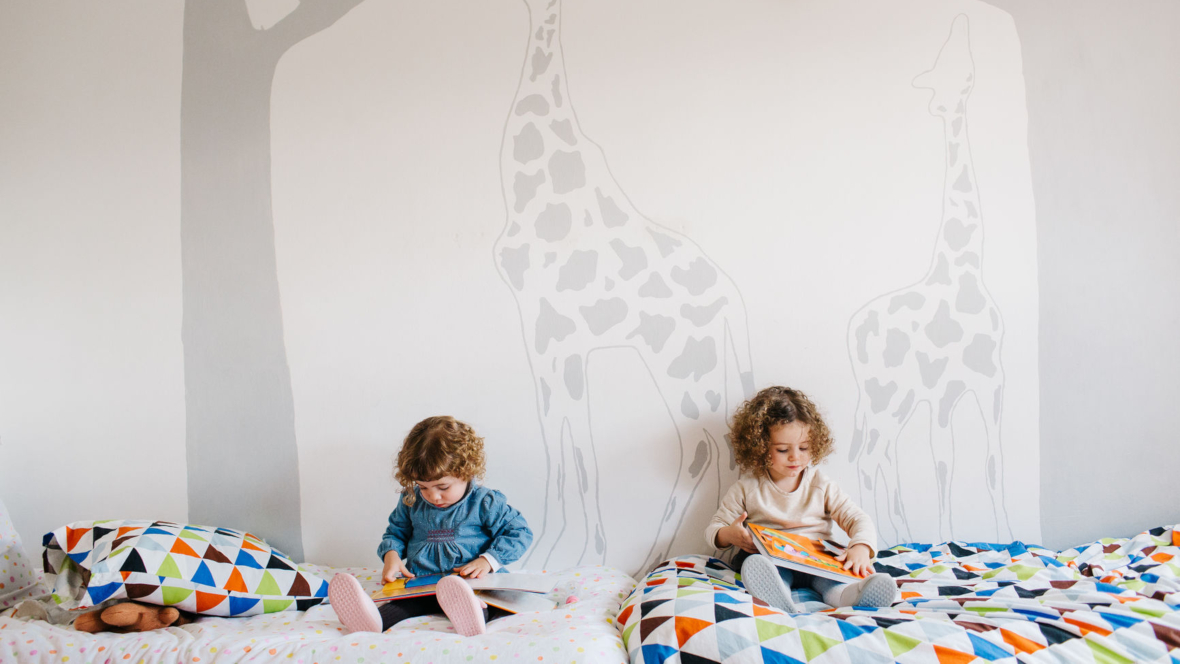Important for the development: Let your child play alone sometimes
Children need for your Developing the game together with the parents is beyond question. But playing is a very flexible term: Basically it is about the time spent together and the attention of mom or dad. So it does not necessarily mean stacking blocks, but you can also plant flowers, cuddle with your child or romp around on the quarry pond.
Playing is extremely important to them development of Babies and children. In the game they discover skills and have their own experiences. Mom and Dad are important. But they do not have to comply with every game request. Children and babies are free to occupy themselves alone.
Weigh the balance between "over-mom" and neglect
But you have to because are always available? No, because parents are not sole entertainers, and no child needs to be kept constantly entertained. On the contrary, children can and should work alone to develop ideas and discover new things at their own pace or to try out skills. This even applies to small babies. You don’t need to have a guilty conscience if you leave your baby to their own devices, as you cook or tidy up.
As in every relationship, it always depends on the right relationship between taking care and having it done. And of course the right ratio cannot be specified in minutes or hours, but is different for each child and for all parents.
Babies also need time to deal with them on their own – in moderation
Babies who are only a few months old can temporarily work alone, and "it is important that children have time for themselves," says Sabina Pauen, Professor of Developmental Psychology at the Ruprecht-Karls University in Heidelberg. Playing alone does not mean being alone! Babies cannot cope alone, nor can they stay alone. Placing on a blanket in the children’s room surrounded by rattles and teething rings is certainly not meant by "playing alone". We speak of short moments in which the baby plays with his own hands or feet, looks at a mobile with his eyes, or watches sounds and movements while you are in the same room. This may not sound very exciting for adults, but it is an important step in the awareness of your own body and the environment.
Allow babies time to focus on something themselves
It is important for Prof. Pauen that babies have enough time to discover interesting things in their environment. A squeaky animal does not always have to be held directly in front of their noses, it is much more sensible to position a few toys within the baby’s reach and to observe which ones they take themselves. Children who had no time in early childhood to focus their attention on something themselves would still expect to be offered later and get bored faster, the psychologist says. If there is too much input, one experience is “overwritten” in the brain by the next, and the only learning effect is to constantly look for new stimuli, which are however not sufficiently processed.
Not too much employment, but not too little either
Finding the balance between too much and too little speech and employment is not always easy, but take it on your own: constant interference is annoying, being left alone with your problems makes you sad. Your child feels the same way. If he is busy with something at the moment, he does not want to be disturbed and is constantly given suggestions as to what else or what else he could do. This also means that you do not have to jump up every time you express your unwillingness – perhaps the unattainable teddy bear is just the incentive to crawl forward or the pride in having built the tower on your own is all the greater. Only when the displeasure gets louder or you notice that the tower will collapse again and again, can you help or give a careful tip.
Combine common game with useful things
Time is relative and very special for children. Sometimes you’ll be amazed that your three-year-old still huddles over his railroad after half an hour, but most of the time, the solitary play phases are shorter. In between, variety is required, and a "dad, look" will definitely sound one or the other time. However, variety does not mean that you have to put on the engine driver’s hat, but it is often the other way around: Two- to three-year-olds usually enjoy imitation games. That means she wants to do what mom or dad do. Just give them a rag when you’re cleaning, let them wash the vegetables when they cook, put the cutlery in the drawer or sort the socks: so you can do your housework, your child is proud to to help and show what it can do – and you will also spend valuable time together.
Are there tricks so that children can do better on their own??
Some children find it much more difficult to play alone than others, and some need more input because they process stimuli faster. But with a few little tricks, you can free up some time and encourage your child to take care of himself temporarily
- Children like it when other people are in the room. Just let it play in the kitchen with wooden spoons and Tupper boxes or put your cuddly toys in bed in the bedroom while you are cooking or sorting laundry. Most children only play in the children’s room for long periods of time until they reach preschool or even primary school.
- Respond to a "mom, you know …" or a "dad, come on". Sit quietly in between, but don’t always take part. Express your interest, but make it clear that you are doing something else and your child is playing alone now
- Think with your child about what they could do alone, or start a game with them that they can continue on their own
- Make agreements that are suitable for both sides: "Just three more laps of the train, then I have to make food and you can continue playing alone" or "I can drink my coffee in peace and then we paint together". Information such as "in 20 minutes I have time for you" is not very helpful for small children, but for example with an hourglass, "turn around three times", a time window can be set.
Disclaimer
familien-gesundheit.de only provides contributions for information purposes. The instructions and information are not suitable for self-treatment. They do not replace personal interviews, professional advice, individual examinations or professional treatment by trained and recognized healthcare professionals such as: B. doctors, pharmacists, midwives or physiotherapists.
Saying of the week
Patience is the trust that everything will come when the time is right.
Newsletter
Register for the newsletter and always be up-to-date:
RELATED ITEMS
-

How children learn to play alone: 7 tips, active beauty
Playing is the best form of learning, and yet many parents plan their offspring with ballet, English lessons, instead of just more…
-

Let your baby play alone! Baby and family
Babies can also keep themselves busy – if mom and dad let them. A developmental psychologist explains why the little ones have such freedom…
-

Why play is important for your child’s mental development
Reading time: 2 minutes On the one hand, we hear again and again today that playing is important for the intellectual development of our children. On the…
-

Reading time: 2 minutes When children of the same age get along without diapers, panic breaks out in many parents. But every child has its own pace to…





